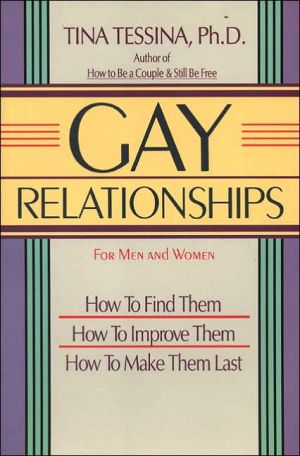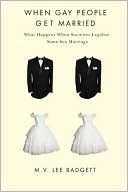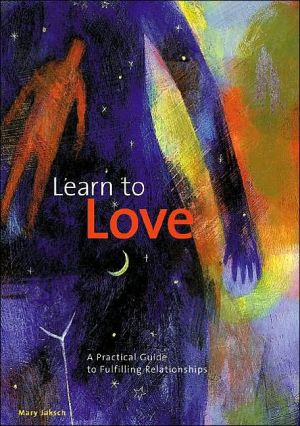Mr. Right Is Out There: The Gay Man's Guide to Finding and Maintaining Love
Chapter One: Love and Relationships\ After you meet Mr. Right, at some point in the relationship you will both say, "I love you." What do you mean when you say, "I love you"? What does he mean when he says, "I love you"? What does anyone mean when he says it? Love is a word we have all used at one time or another, but it is also a word that carries many meanings.\ I have asked hundreds of gay men, "What is love?" and there has been no shared or agreed-upon answer. Even lovers have different...
Search in google:
Who is Mr. Right? And once you find him (and you will, according Dr. Kenneth George), how do you keep him? For countless gay men, desiring to join the 4 million other male couples in the United States in a stable and committed relationship, this question keeps them awake at night. For gay men in relationships, keeping their love strong, sexy, and alive, presents numerous challenges. Now, in one book, Dr. George approaches these issues in ways that may surprise you, but will also give you a new lease on romantic life. Mr. Right Is Out There will coach you as you take those traumatic first steps called "meeting men," will guide you as you form an emotional and intimate bond, and will help you grapple with those uniquely male issues you will face as one half of a gay couple. Mr. Right Is Out There will also help you avoid the Mr. Wrongs who will do their best to distract you on your quest and keep you on track as you encounter common pitfalls relating to sex, monogamy, trust, and emotional intimacy. Whether you're old or young, country or urban, single or involved, Mr. Right Is Out There is the ultimate guide to finding, keeping, and maintaining the love you want and deserve. Lambda Book Report In this book about male relationships, George covers such issues as love and emotional intimacy, negotiating and resolving differences, and creating and maintaining sexual excitement. His goal is to guide and help you grapple with uniquely male issues you will face as one half of a gay couple. Mr. Right will also help you avoid the Mr. Wrongs who will do their best to distract you on your quest to find, keep, and maintain the love you want and deserve.
Chapter One\ Love and Relationships\ After meeting Mr. Right, at some point in the relationship you will both say, "I love you." What do you mean when you say, "I love you"? What does he mean when he says, "I love you"? What does anyone mean when they say it? Love is a word we have all used at one time or another, but it is also a word that carries many meanings.\ I have asked hundreds of gay men, "What is love?" and there has been no shared or agreed upon answer. Even lovers have different answers. When I ask male couples who are experiencing major problems why they are staying together, they usually say, "Because we love each other." This answer doesn't tell me much.\ What does love mean to you? Your answer is important and may help you understand your past, present, and future relationships. It may also help you figure out why you may have trouble forming and developing long-term relationships.\ What You May Have Learned About Love\ As a child, you learned if you were really good, your mother said, "I love you." If you were punished for being bad, you may have been told, "Mommy still loves you." Early in life you learned what you needed to do to be loved. You conformed to your parents expectations, which guaranteed your parents' love and protection. You believed you wouldn't be abandoned if you met their expectations. You believed you were safe if you were loved. As a child, you tested your parents' love and their limits. You placed demands on them to make sure they continued to love you. You learned from your parents about love.\ As an adolescent, you learned about love from television, movies, and friends. You found yourself attracted to someone, and you were told you were in love. You may have also been told this was puppy love or adolescent love and that it would not last long. You saw sexual intimacy and were then told this was love. You learned the word love, and associated it with various definitions.\ Love has different meanings for different people, which makes it almost impossible to know how the word is being used by anyone. Some of the following expressions are just a few uses of the word "love":\ "I fell in love the moment I saw you." (Love means being sexually attracted.) "If you love me, you would..." or "Because I love you, I..." (Love means doing certain behaviors.)\ "I love you and will always take care of you" or "With our love for each other, it's the two of us together against the world." (Love means being dependent.)\ "I love you so much I remember our first dinner together, what you wore, where we went, and what we ordered." (Love means being romantic.)\ Some of you may have heard these expressions as a child or adolescent and learned that sexual attraction, behaviors, dependency, or romance is the definition of love. You may still believe these definitions of love--they are very enduring. But they may not be helping you today to find and maintain a relationship with Mr. Right.\ These definitions are components of love, but individually they are not love. Love includes sexual attraction, but love is not sexual attraction. Love includes behaviors, but love is not behaviors. Love includes dependency, but love is not dependency. Love includes the romance talked about by poets and songwriters, but love is not romance.\ Sexual Attraction Is Not Love\ Jim and Scott are good-looking men in their mid-20s. They met in college and were immediately sexually attracted to each other. Shortly after, they began spending their nights together and having a lot of sex. They believed their dreams had finally come true. Early in their relationship they began telling each other how much they were in love. They believed this relationship would last forever.\ Frequently, we meet a man, find ourselves attracted, and begin to believe we are in love. How many times have you met a man and shortly afterward told your friends you were in love? How long did it take before you called yourselves lovers? Was this love? Were you really lovers? Are Jim and Scott in love with each other?\ In reality, this feeling we were calling "love" (Jim and Scott are also calling this feeling "love") was more than likely sexual attraction. Sexual attraction is the lust we feel for another man. Lust between two men frequently begins at first sight. When you experience lust, everything feels wonderful. You start to develop warm feelings toward each other. You believe you have finally found Mr. Right. You are both floating on cloud nine.\ During the time you are both feeling lust, you present the best picture of yourself to one another. You tell him what he wants to hear; he does the same. You do what you can to please him; he does the same. You see him the way you want to see him; he does the same. Neither of you sees anything wrong with the other. This is the perfect lover each of you has been waiting to meet. You are both in "love."\ Jim has fallen in love with the image Scott has presented. He really does not know Scott. Jim only knows what Scott wants him to know. Scott, too, only knows what Jim wants him to know. They each believe the other is perfect. While experiencing lust, you may do things you believe lovers should do, such as calling yourselves lovers, meeting each other's friends, having dinner with your families, spending most of your time together, and moving some of your clothes and belongings into each other's apartment. You may also find yourself doing things you normally would not do and doing what you believe he wants you to do. My first lover was extremely attractive. I was floating on a cloud. I went out to every party with him. I danced until dawn. I didn't care that he was a night person (I am a day person). I get out of bed early in the morning--jogging, reading, writing, having breakfast--and am usually ready for bed by eleven at night. He slept until noon on the weekends, and then was ready to go out partying until early morning. I still tried to get up early in the morning, but usually I slept late. I was in "love."\ Relationships based on lust usually don't last very long. In fact, some researchers believe lust relationships last only a couple of years. What happens when you start to drop the mask and be the real you? What happens when he does the same? What happens when you see him as he is, rather than as you want him to be? If you don't like what you see, you may try to change him. You may even become annoyed at what you had initially found charming. Lust relationships can cause problems that will eventually drive the couple apart. Relationships require more than lust to sustain.\ My relationship with my first lover was based on lust. Imagine what kind of a relationship we had after the first couple of years. When I got up early in the morning and he was still in bed, I began to resent not having him around at that time of the day. I began to resent only planning nighttime activities with him. I began to resent the relationship. I was seeing him as he really was--and I didn't like what I saw. I was no longer experiencing lust.\ Love does not begin at first sight. Lust, however, does begin at first sight. What many men believe is love may in fact be lust. Many men experience lust and mistake these feelings for love. Although sexual attraction is a part of love and a part of being a male couple, sexual attraction is not love.\ Behaviors Are Not Love\ I grew up in a traditional family, in which my father worked and my mother stayed home and took care of the house. My father was a workaholic, and didn't have much time for me. He never said he loved me, but I did know he did. He always took me out to dinner on special occasions. I also knew my mother loved me, since she was always there for me. She fixed me lunch and dinner, and when I was sick she cooked something special and brought it to my sick bed. My parents demonstrated their love for me through food. I knew they loved me based on those behaviors.\ As children we learned our parents demonstrated love through their behaviors. What they did for us "proved" their love. We frequently heard, "Because I love you I did (fill in the blank)." Even if they were strict disciplinarians, abusers, or distant, we learned through their behaviors that we were loved. When we were bad, we may have been spanked: "Because I love you, I am spanking you." (This may help explain why some men like to be spanked.) From our parents' behaviors we learned they loved us.\ As children, we also learned to show love through our behaviors. Our parents would say, "If you loved me you would (fill in the blank)." We learned what we had to do to be loved. We learned from our parents how to be the best little boy in the world, and as long as we were/are the best little boy we were/are loved. We learned to show our love through behaviors.\ We also learned our parents withheld their love if our behaviors were not acceptable. Some of us knew our fathers wanted us to be good at sports, but some of us weren't good at sports. We may have tried as hard as we could to hit the ball or run fast, but we just didn't measure up. We may have then felt unloved by our father. We knew we were expected to behave in a certain way to win love. As children and adolescents, we learned what to do and what not to do to show our love. We also learned how others show their love for us. Now, having met our potential Mr. Right, we think:\ He loves us because he does certain things.\ We demonstrate our love for him through what we do.\ We are expected to behave in a certain way.\ In reality, showing our love means proving our love for each other.\ If a relationship is based on proving love, one or both of the men will feel a lot of frustration and hurt because it is difficult to always prove love through behaviors. What happens when you don't remember his birthday? What happens when he works late and doesn't make it home in time for dinner? What happens when you want to take separate vacations? If he doesn't prove his love, you may try to change him. You may even become angry when he doesn't change. ("If you loved me you would stop smoking." )\ Since I associate love with food, I take Christopher (the man I love, my lover, spouse, significant other) out to dinner on special occasions and cook for him when he needs nurturing. This behavior, however, got me into trouble because I became hurt when he did not take me out to dinner on special occasions and when I didn't get dinner in bed when I was not feeling well.\ Christopher had learned different behaviors for love. He shows his love by writing poems on special occasions and by singing and dancing for me (I was surprised the first time his mother burst into song when the three of us were traveling together in her car). Christopher also learned that when the person he loves is not feeling well, one should leave him alone. The behaviors he learned from his parents are different from the behaviors I learned from mine. Christopher gets annoyed when I dote on him when he isn't feeling well. He still thinks it's strange that I don't sing with him in the car.\ Christopher and I have learned to accept and to appreciate our different behaviors for showing our love to each other. Behaviors are a part of love, but behaviors are not love.\ Dependency Is Not Love\ Before meeting, Bill and Jeff were involved in a lot of activities, including a swim team, the Metropolitan Community Church, and outings with friends. Both were always busy. Their primary goal in all of these activities, however, was to meet a husband. "I want a lover, and when I find him I will be happy."\ Bill and Jeff met through a mutual friend. As they dated, they realized they shared many interests. Both enjoyed working with computers, going to the theater, watching old movies, and playing cards. They enjoyed their time together, but gave up socializing with others as well as participating in outside activities. They began to depend upon each other, and the more they took care of each other, the more they believed they didn't need anyone else. They were in "love." After a year, Bill and Jeff moved in together.\ Most men enjoy their lovers' taking care of them. Most men also like to take care of their lovers. They enjoy a mutual dependency. Being taken care of at various times during a relationship is part of the joy of being a male couple. Taking care of each other, however, is much different than being dependent on each other. A dependent relationship is built upon the following beliefs: (1) one or both men is unable to take care of or function by himself; (2) together the couple can meet all each other's needs; and (3) one of the men can meet all of his lover's needs. Bill and Jeff have a relationship where both are dependent upon each other. In some relationships, however, only one of the men is dependent upon his lover. In a dependent relationship, one or both of the men may feel trapped, helpless, or powerless. A "yes" answer to the following questions may indicate you have formed a dependent relationship:\ Does your lover do what you believe you cannot do for yourself?\ Must you have a lover to be happy?\ Is your sense of well-being related to your lover's attitude toward you?\ Do you rely on your lover to initiate or make plans?\ In their dependency upon each other, Jeff is the organizer and Bill is the emotional caretaker. Jeff plans their daily activities, maintaining the list of things to do. He also balances the checkbook, makes their appointments, goes grocery shopping, and reminds Bill of his agreed-upon responsibilities. Bill reaches for Jeff's hand in the car, kisses him on the neck, puts the finishing touches on what Jeff wears, shows affection, and frequently says "I love you."\ Bill and Jeff both work hard during the day; Bill is a legal secretary, and Jeff is a computer programmer. The lawyers in the firm where Bill works are demanding and critical. Frequently Bill comes home at the end of the day feeling down, takes a hot bath, and gets into bed. Jeff has trouble understanding this behavior. He sits at the foot of the bed telling Bill it's only a job and that things will get better. Jeff then asks Bill to get up, have dinner, and spend the evening with him.\ In Bill and Jeff's relationship, each is the caretaker for the other. They believe "It's you and me against the world." They think that since they found each other, fell in love, and are a couple, they don't need any one else. This dependency implies neither one of them is able to take care of himself, and needs to be part of a couple to survive. This relationship works, except when Bill is feeling fragile (after a hard day at work) and when Jeff wants to spend time with Bill (after a hard day at work).\ Bill does get out of bed to be with Jeff, but he would rather have cuddled with Jeff for an hour before dinner. During the evening, Bill tries to seduce Jeff into having sex (to have some cuddle time). Jeff finds Bill's behaviors distracting and annoying because he had rented a video they both wanted to see. An argument begins, both accusing the other of no longer loving him.\ When Bill and Jeff are not meeting each other's needs, an argument usually begins. Any argument or disagreement is threatening to them and confirms their belief that they are no longer loved. Actual rejection is not necessary, since the mere hint of criticism triggers their fear of rejection. This fear causes one or both believe he will be abandoned and left alone to take care of himself. Their dependency makes them feel trapped and helpless. To keep their relationship working, Bill and Jeff continue their dependence upon each other as proof that they are still loved. Being dependent upon each other is "love" for both Bill and Jeff.\ What many men believe is love may really be dependence. Many men mistake "being taken care of" for love. This kind of dependency, however, can destroy a couple. These relationships are also unhealthy for each of the men. We are all dependent in our relationships at various times, but we need more than one reliable source of support. Although dependency is a part of love and a part of being a male couple, dependency is not love.\ Romanticism Is Not Love\ Mark is 45 and a high school art teacher. Greg is also 45, and a physician. Before meeting each other, they had been in several short-term relationships, enjoyed their careers, and were busy with many outside activities. When they met at a gay bar, they found each other sexually attractive and quickly exchanged phone numbers, but neither one of them called the other. Over the next few months, they continued to see each other at the same bar, both smiling and acknowledging the other. Mark showed up hoping Greg would be there and would ask him out, but he never did. One night Mark handed Greg a card he had designed that included his phone number and a cute message. Greg finally called and asked Mark out for dinner the following Saturday.\ They dated over the next few months. Mark eventually took Greg to the school where he teaches for their annual art festival. Greg also introduced Mark to his colleagues at the medical center where he works. They found many mutual interests and liked each other's friends. They also liked one another and enjoyed their time together.\ Mark and Greg talked about becoming a couple and what that meant to each other and to their careers. They finally bought a beautiful house in the suburbs as their "marriage."\ They have now been together for 15 years, and the anniversary of their first dinner together is quite important to Mark. He remembers what they both wore, where they had dinner, and even what they ordered.\ Mark is a romantic. Many people turn to romantics for an answer to "What is love?" Mark, as well as many other gay men, songwriters, and poets would say love is the heart-fluttering rush experienced when you see someone across a crowded room. Romantics place great significance on remembering their early dating. Therefore, anniversaries are important to them--the date of their first meeting, when they kissed, had sex together, and their song. Romantics consider Valentine's Day a national holiday.\ Every year, Mark and Greg have predictable conflicts on Valentine's day, Mark's birthday, and their anniversary. Mark remembers all these dates; Greg doesn't consider these events important. Every year Greg forgets the anniversary of their first dinner together, and Mark gets upset with Greg.\ Many of us enjoy romance at various times, but being in love is paramount to romantics. Their lives revolve around being in love, and they are unhappy if they are not in love. Romantics live in a fantasy world, seeing their lovers how they want to see them-- only seeing positive qualities and ignoring any negative aspects. Mark has a romantic image of Greg that he wants to believe. Romantics become hurt, however, when their lovers don't live up to their expectations, such as remembering anniversaries or holidays. Mark works hard to get Greg to become a romantic.\ Love is more than having "our song," an anniversary of a first date, or remembering every occasion. Being in love is more than being romantic. Although being romantic is a part of love and a part of being a male couple, romanticism is not love.\ So What is Love?\ You meet a man and are attracted to him. You have sex, and start to spend time together. You have good conversations along with a lot of affection. At some point you believe you are in love, and eventually become a couple. But how do you know you are in love? What is love?\ ___________________________________________________________________ ACTIVITY\ Think about your best friend. Your best friend can be a man or a woman. Your best friend can be gay or nongay, any race, religion, age, etc. What do you like about this person? Why do you like to be with this person? What do you experience when you are with each other? What makes this person your best friend?\ Write the heading "Characteristics of My Best Friend," then list those qualities.
AcknowledgmentsxiIntroductionxiiiChapter 1Love and Relationships1Chapter 2Being Emotionally Intimate20Chapter 3Mr. Right or Mr. Wrong?64Chapter 4Finding Mr. Right77Chapter 5Becoming a Male Couple92Chapter 6Negotiating and Resolving Differences111Chapter 7Sexual Excitement138Chapter 8Homophobia and Coming Out155Chapter 9Man to Man168Appendix175
\ Lambda Book ReportIn this book about male relationships, George covers such issues as love and emotional intimacy, negotiating and resolving differences, and creating and maintaining sexual excitement. His goal is to guide and help you grapple with uniquely male issues you will face as one half of a gay couple. Mr. Right will also help you avoid the Mr. Wrongs who will do their best to distract you on your quest to find, keep, and maintain the love you want and deserve.\ \







